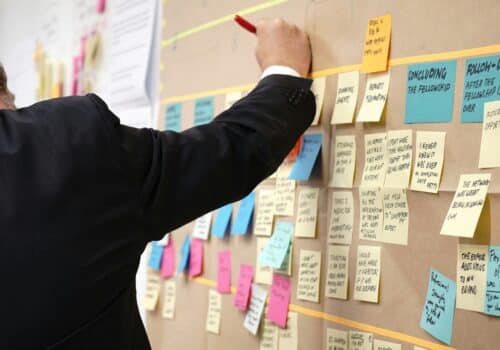How an ERP System Can Improve the Employee Experience

You feel fried.
Now imagine that all of your employees are feeling that way, every day.
They’re fatigued, and there little to no room for strategic, creative or innovative activities that lead to the transformational changes your company needs to remain competitive.
I believe it’s critical to bring employee experience to the forefront of your decision-making process as a leader because it has a bigger impact on the health and growth rate of a company than all the automation in the world.
For the long-term health of your company, your employees need to remain engaged and energized. When your people stagnate, so does your organization.
If you’re like most of our clients, however, I don’t need to beat you over the head about that. Your employees are like family. Improving their experience matters to you.
Your ERP system can be an important tool in this regard.
There is a direct line between an effective ERP system and an improved employee experience. Here’s how it works.
Where Employee Experience and an ERP System Meet
When your employees are spending all their time in Excel or on other monotonous, error-prone manual tasks, it’s a recipe for disengagement, disinterest, and decreased productivity.
When it goes on too long, individual morale takes a hit. And that can spread through teams, departments, and eventually the entire company.
Red alert, manufacturing companies: According to a State of the American Workplace report from Gallup, manufacturing workers are the least engaged of any occupation studied, with a whopping 75% of employees disengaged. Gallup also reports that disengaged employees cost the U.S. $483 billion to $605 billion each year in lost productivity.
On the flip side, when your people can rid themselves of even some of the mundane detail work — work which most are over-qualified for in this day and age (68%, in fact, according to that report) — it frees them up to be more creative and innovative. Your employees become more engaged, they feel better about their work and their contribution to the company, and they are ultimately more productive.
That same Gallup report found that companies with engaged employees outperform those with less engaged employees by 202%. And — especially important for manufacturing companies — a different Gallup report found that companies with higher employee engagement levels reported 70% fewer safety-related incidents.
Plus, creativity and innovation are contagious. Improved morale sweeps through teams, departments and companies just as quickly a poor morale does — and often quicker.
An ERP helps in this process because it pulls your employees out of more mundane, monotonous activities and into more creative, innovative and productive activities. It’s a win for employee experience, and win for a growing company!
3 Ways Your ERP Can Enhance the Employee Experience
An effective ERP system does more than eliminate manual tasks, however. In my many years as an ERP consultant helping companies select, install, integrate and maintain these software platforms, I’ve seen ERPs enhance the employee experience in these three key areas:
1. Smoother onboarding
Organizations operating in office environments are usually more focused on the HR services component of ERP software — but it’s becoming more important in manufacturing environments, too. Talent acquisition and retention are growing challenges, and a more streamlined onboarding process driven by a strong ERP system can go a long way toward staying competitive as an employer.
The onboarding stage of the talent management process is your first opportunity to affect the employee experience. Fumbling in the early stages of the employee’s time with your company can have long-lasting negative impacts — but conversely, making the onboarding process pleasant and smooth can help establish loyalty and improve confidence and optimism.
Onboarding processes that can be improved by ERP software include everything from document completion to training to goal setting to benefits guidance.
The benefits piece is especially important to note. An interesting (and disheartening) study from the Society for Human Resource Management (SHRM) reveals a large gap between the benefits companies offer their employees (specifically flextime, employee assistance, and retirement plans) and the benefits employees think they have.
An ERP with an effective HR services component can help you make sure your employees are aware of all the benefits you offer.
2. Improved autonomy
One of the most powerful things leaders can do for their employees is give them opportunities to apply their natural talents, skills and knowledge on the job.
Gallup did the math in their report, and it was eye opening. In response to the survey question, “At work, I have the opportunity to do what I do best every day”, 40% of the U.S. employees surveyed strongly agreed with that statement. If you increase that number to 80%, you could realize a 14% increase in profitability and a 46% reduction in safety incidents.
Increasingly, remote work is becoming part of this equation — even in the manufacturing space. The Gallup report found that the transportation, manufacturing or construction, and retail industries have experienced the greatest surge in working remotely, following only the finance, insurance and real estate industries. And employees who spend at least some of their time working remotely have higher engagement than those who never work remotely.
An ERP can help with improving autonomy in a few ways. The HR services components of benefits accessibility, training opportunities and visibility to career advancement opportunities are obvious drivers. But modern ERP systems — particularly those deployed in the cloud — also give employees more flexibility in how, where and when they work.
3. Increased productivity
Generating reports, tracking time, monitoring inventory levels, and processing orders are all incredibly time-consuming tasks, and they’re ripe for human error. An ERP can automate many of these tasks while improving accuracy and eliminating redundancy. This leaves employees freer for tasks that require more thought and creativity.
In addition to this, though, an ERP centralizes disparate systems, from finance to marketing to manufacturing to inventory control. Data, reporting, and customer support can be centralized with an ERP, too, which improves efficiency overall and eliminates much of the duplication of data
One case study from IQMS revealed a 50% improvement in employee productivity when the manufacturing ERP software was installed. That may be an outlier, but in my experience, it’s probably not far off from the average improvement I’ve seen in employee productivity with a solid ERP system in place.
An ERP Can Reduce Stress — for Everyone
From a leadership standpoint, the more you can automate and optimize mundane transaction processing, the more time your employees have for doing work that matters — to them and to the company. The more time they’ll have for growing themselves, coming up with new ideas, and improving your organization. And the more time they’ll have for being creative and innovative, and adding real value.
There is a direct line between an ERP and employee experience. And there is also a direct line between employee experience and the success of your company. Connect the dots.
I’d love to share more with you about the employee experience improvements I’ve witnessed at companies that have implemented ERP systems. Let’s talk.
ERP Readiness Self-Assessment
Is your organization ready for a new or upgraded ERP solution? Find out with this complimentary self-assessment.
Doing Business Better
You strive for excellence, believe in your people, and want to do things right the first time. And you know that you need help to get to the heart of your business challenges and make the best choices for the future of your privately held manufacturing and distribution company. That’s where we come in.
We help you focus and find exactly the right path to accelerated growth and sustainable success — from your people to your processes to your ERP software.




